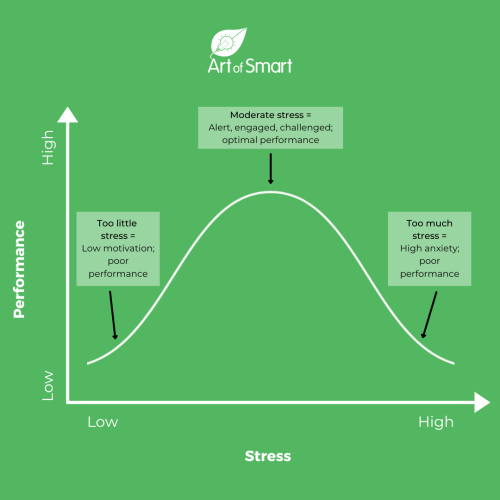How to Minimise Stress and Anxiety During HSC Assessments & Exams
Guest post by The Art of Smart

Exam periods can be riddled with a lot of unnecessary stress and anxiety. You might be thinking, “What are some things I can do to tackle this nervous energy?”
Well, you’ve come to the right place! You’ll become well acquainted with our tips and tricks to minimising stress and anxiety, so you can ace your assessments and exams with ease.
What are you waiting for? Let’s get into it!
Understanding Why We Experience Stress and Anxiety
Familiarising ourselves with the reasons behind our exam stress can provide us with a logical and introspective perspective when such instances occur.
When your body perceives a threat, it triggers the release of stress hormones like adrenaline and cortisol, leading to temporary physical alterations. This reaction is commonly observed prior to an impending exam.
The hormone secretion elevates your heart rate, facilitating the transportation of blood to crucial muscles, boosts respiration to enhance oxygen supply, and tenses up the muscles, preparing them for action.
The intensity of stress can be graphically represented by a bell curve.

Did you know that a moderate amount of stress can actually help us perform at our best? But, what even is a “normal” level of stress?
Well, physically, it can show up as a tummy ache, headache, tense muscles, fast breathing, a racing heart, sweating, shaking, feeling dizzy, needing to pee a lot, having the runs, feeling totally exhausted, or maybe even a combo of these symptoms.
Emotionally, it might make you feel like something bad is about to happen, super panicky or nervous, unable to focus, randomly angry, or restless, especially when you’re around other people.
Stress only becomes a real problem (read: too high) when it gets so intense that you can’t handle it and do normal stuff. Like, if you can’t get out of bed to go to school, that’s when things can be concerning.
But don’t worry if you’re struggling with stress – there’s always professional help available if you need it.
Mental blocks during exams often stem from lack of confidence in one’s understanding of the material. However, consistent studying and preparation can build confidence and reduce these blocks.
To create a study plan, simply make a to-do list for each subject, outlining everything that needs to be covered before the exam. This can help you prepare effectively and with confidence.

Getting enough sleep before an exam is crucial for cognitive performance. Research shows that less than 7 to 9 hours of sleep within 17 to 19 hours of an exam can impair your ability to think, which is the equivalent to being drunk.
Inadequate sleep can result in irritability, reduced focus, heightened stress and anxiety levels during the exam. Getting sufficient sleep helps you feel calmer and more relaxed on the day of the exam!
Being around friends who stress you out during exam time is not helpful. It’s best to distance yourself from them before the exam, even if temporarily!
You don’t need to end your friendship, but let them know that you need space to focus on your own preparation. This can help reduce stress and create a calmer mindset before entering the exam room.
Flicking through notes right before an exam does more harm than good, as you’re unlikely to remember much. It’s better to only refer to them if something pops up before the exam that you want to double-check.
Rapidly reading through notes can increase stress and cause mental blanks during the exam, so try to stay calm and trust in your preparation
Without a plan for an exam, you may feel lost and overwhelmed. Just like travelling without a map, having no idea where to go or when to stop!
So, it’s essential to make a plan beforehand, decide how much time to spend on each question, and determine if you will answer them in order. Having a plan helps reduce stress and increases your chances of success.
What mindfulness technique can you use to ease some stress before an exam?
Box breathing is a simple breathing technique that can help reduce stress and anxiety by calming your nervous system. It involves taking slow, deep breaths, and counting to four on each inhale, hold for four, exhale for four, and hold for four again.
To use box breathing as a mindfulness technique before an exam, you can start by finding a quiet place where you can sit comfortably. Take a few deep breaths to settle in, then start to breathe in through your nose for four seconds, hold for four seconds, exhale through your mouth for four seconds, and hold for four seconds before repeating.

While you are doing box breathing, try to focus your attention on your breath and let go of any distracting thoughts or worries. If your mind wanders, gently bring your attention back to your breath. This can help you stay calm and centred, reducing stress and anxiety that can interfere with your exam performance.
Box breathing can be done anytime and anywhere, so you can use it as a tool to help you feel more relaxed and focused during the exam itself.
How to Help Yourself Prepare for Your HSC Exams
Basically, the flooding technique is like confronting your worst exam fears head-on. You take your biggest exam-related worry, like forgetting everything you studied, and imagine it happening in vivid detail.
It might sound scary, but the idea is that by facing your fear in a safe and controlled way, you’ll feel less anxious when the real thing comes around.
The idea behind this technique is that by repeatedly exposing yourself to exam-like conditions, you’ll become more comfortable and less stressed over time. This can help you build confidence and resilience, and ultimately perform better on the actual exam.
Another way to implement the flooding technique is by giving yourself 10% less time to do the exam. For instance, if your exam is 3 hours in length, then you should give yourself around 2 hours and 40 minutes to complete a practice exam.
With this added time pressure in a controlled environment, you’ll feel more confident tackling the exam in the full 3 hours on the day because you’ve been exposed to the exam scenario already!
Right before your exam, you’re probably feeling intense amounts of stress, so it’s important to be able to deal with any nerves or anxiety you may be experiencing.
Think about a short little activity you can do that will help you get into the right headspace before an exam. You might think about doing one of the following:
- Meditating
- Listening to music
- Dancing
- Going for a run
- Playing your favourite sport
- Hanging out with friends
With this added time pressure in a controlled environment, you’ll feel more confident tackling the exam in the full 3 hours on the day because you’ve been exposedWhatever it is that you do, you’ll want to ensure that you avoid things or people that may add to the stress that you’re feeling. Your aim is to get in the zone and focus on doing something that makes you feel good, so you can head into your exam with confidence!
At Art of Smart Education, we’re an award-winning provider of holistic tutoring and mentoring for students in years K-12. Our mission is to help students answer the difficult question, “What am I going to do with my life when I finish school, and how do I get there?”
We understand that true success involves mastering study, career and leadership skills while maintaining your wellbeing, not just excelling in academics and as a result, over the last decade, we’ve supported over 10,000 students to achieve their best and maximise their options for life after school.
Each year over one million young Australians, parents, and teachers access our guides, videos and resources to navigate the journey through high school.
Talking helps, we’re here for you
Any issue. Any time. If you’re ready to talk about it, we’re ready to help.
Talking helps, we’re here for you
Any issue. Any time. If you’re ready to talk about it, we’re ready to help.
If you need to talk to someone NOW, call Lifeline on 13 11 14 or Kids Help Line on 1800 55 1800. If life is in danger, call 000